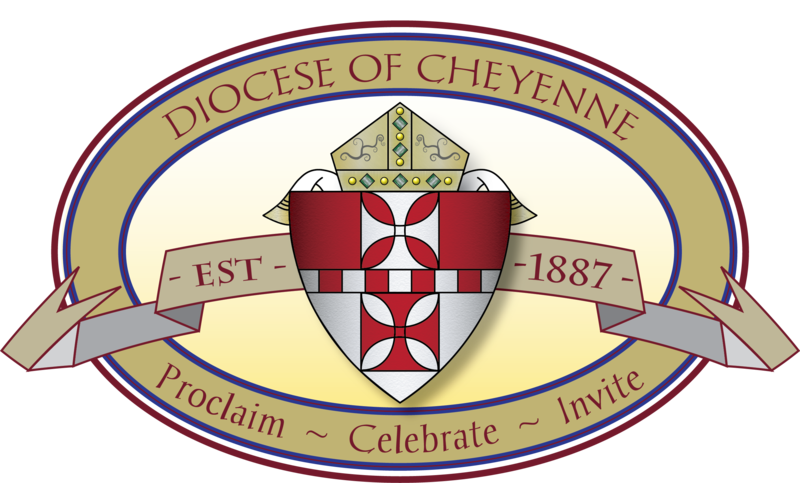
Diocese of Cheyenne
This year we face the new threat of the spread of the Coronavirus (Covid-19). One of the greatest challenges will be to provide science-based information in the face of fear. Dioceses across the U.S. are taking a variety of approaches, from doing nothing to mandating communion in the hand. One of the worst things we can do is make changes that have little preventative effect that create a false sense of security. At this point, the Center for Disease Control, has advised that the Coronavirus spreads in a manner similar to Influenza—mainly through respiratory droplets that are produced when an infected person coughs or sneezes. Transmission happens most often when people are in close proximity to one another. 1 Please implement the accompanying directives for the influenza season with the following adaptations. The very best prevention is for people who are ill to stay home. This can be especially challenging for many of the faithful who wish to honor the serious obligation to attend Sunday mass but do not understand the greater obligation to stay home in order to prevent infecting others. You are strongly urged in your preaching and bulletin announcements to draw attention to this reality. With the Coronavirus, people are mostcontagious when they are most symptomatic. In a memorandum dated February 28, 2020, the USCCB Committee on Divine Worship says that in certain places the precautionary measure of exchanging the sign of peace without physical contact may be implemented. You may do this if you feel it would benefit your community at this time. The memo also offers the option of suspending Holy Communion via the chalice. If you judge this would be helpful for your community, you may temporarily suspend the chalice, but this should be accompanied by a strong encouragement to receive the Body of the Lord in the hand to eliminate contact with saliva and breath vapor when receiving on the tongue. At this point, these are the only recommendations from our diocese. We will continue tomonitor the status of the spread of the Coronavirus along with recommendations from the USCCB and CDC. Your parish may wish to establish a health care fund to assist those in your community who have no health insurance or who work in a job that does not offer a sick-leave benefit. These are often the most vulnerable to infection and suffer the greatest impact if infected.
Liturgical directives to be used during the flu season—2020
There are times of the year when influenza is more active. Pastors are asked to implement the following directives until the heightened flu season has ended. These directives are based on consultation with an infectious disease specialist and a pulmonologist regarding the best practices to reduce the spread of the virus
1. The greatest risk for contracting the flu virus is proximate exposure to an infected person. The obligation to worship at the Sunday Eucharist is very serious. However, for the health of the worshipping community, please remind parishioners to stay home when they are ill. When they are ill, the obligation for attendance is abrogated. Most of the state does have access to a televised broadcast of the Sunday Mass which is a service provided specifically for the sick and homebound. Staying home is an act of charity for the.
2. Proper washing of hands and vessels is essential. Please remind all priests, deacons and liturgical ministers to thoroughly wash their hands before any liturgical celebration. In addition to proper hand washing, the use of alcohol-based hand sanitizer is also recommended. After purification, the vessels used for the Body and Blood of the Lord should washed with soap following each liturgy.
3. The sign of peace is an integral part of our worship and it is inappropriate to dispense with this ritual action. You may suggest that your community refrain from shaking hands and instead choose a gesture such as a bow of the head or simple exchange of the verbal greeting of peace.
4. It is desirable always to offer the fullest expression of Communion under both species and it is the expectation in the Diocese of Cheyenne that both species be served to the faithful. If you wish to suspend offering the Precious Blood, please make your request in writing to Bishop Steven before doing so. The medical community agrees that the chance of contracting the influenza virus through drinking the Precious Blood is miniscule. 1 The Center for Disease Control makes clear that there is no evidence linking infection to sharing a common communion cup. 2 The risk will be further minimized by proper use of the purificator and turning the cup between communicants. Please review this procedure with both ordinary and extraordinary ministers of Holy Communion. You may also encourage members of the assembly to refrain from receiving the Precious Blood if they are not feeling well.5. Once the flu threat has passed, all regular practices of worship will resume following noticefrom this office. Thank you for your concern for the people of God and your cooperation in these preventativemeasures
